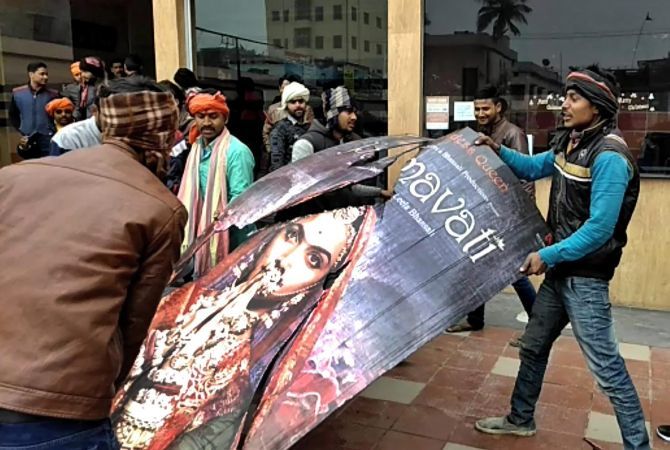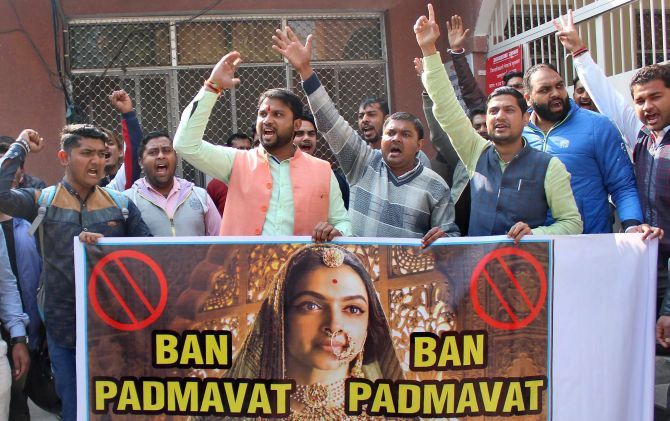The apex court also prohibited other states from issuing a notification against the exhibition of the movie.

Photograph: PTI Photo
The Supreme Court on Thursday paved the way for the nationwide release of Bollywood movie Padmaavat on January 25 by lifting the ban on the screening of the controversial film in Gujarat and Rajasthan.
The apex court also restrained other states from issuing any such notification or order banning the screening of the film, with Chief Justice Dipak Misra saying 'the whole problem is when the exhibition of a film is stopped like this, my constitutional conscience shocks me'.
"There were so many films earlier, but nobody really bothered. 'Bandit Queen' had passed the test of the Supreme Court," the CJI, who was heading the bench, said.
The film, starring Deepika Padukone, Shahid Kapoor and Ranveer Singh in lead roles, is based on the saga of historic battle of 13th century between Maharaja Ratan Singh and his army of Mewar and Sultan Alauddin Khilji of Delhi.
The decks were cleared for the release of the film as the apex court stayed the orders and notifications issued by Rajasthan and Gujarat governments prohibiting its screening.
Haryana and Madhya Pradesh governments had not issued any formal order but had stated that they would not allow the exhibition of the film.
"In view of the aforesaid, we direct there shall be stay of operation of the notifications and orders issued by the respondent-states and we also restrain the other states to issue notifications/orders in any manner prohibiting the exhibition ...," the bench, which also comprised Justices A M Khanwilkar and D Y Chandrachud, said.
In its interim order, it observed: "It should always be remembered that if intellectual prowess and natural or cultivated power of creation is interfered without the permissible facet of law, the concept of creativity paves the path of extinction; and when creativity dies, values of civilisation corrode."

Photograph: PTI Photo
Maintaining that states were under constitutional obligation to maintain law and order, the apex court said that this duty also includes providing police protection to persons who are involved in the film, its exhibition and the audience watching it.
The remarks assume significance in the wake of recent attacks, including one in Muzaffarpur (Bihar) on Thursday, against the release of the film.
The set of the movie was vandalised twice -- in Jaipur and Kolhapur, while its director Sanjay Leela Bhansali was roughed up by members of the Karni Sena last year.
Referring to the apex court's 2011 verdict in M/s Prakash Jha Productions case, which was about the decision taken by some states suspending screening of the film Aarakshan for a specified period, the bench said the state authorities should keep in mind the judgement which clearly said that it was the paramount obligation of the state to maintain law and order.
"Keeping in view the fact situation, we have no hesitation in stating by way of repetition and without any fear of contradiction that it is the duty of the state to sustain the law and order situation whenever the film is exhibited, which would also include providing police protection to the persons who are involved in the film/in the exhibition of the film and the audience watching the film, whenever sought for or necessary," the bench said and posted the matter for hearing on March 26.
The top court passed the interim order on the petition by Viacom 18 Media Pvt Ltd and other producers of the movie challenging bar on screening of the Sanjay Leela Bhansali-directed movie by Gujarat, Rajasthan, Haryana and Madhya Pradesh.
The bench, in its order, noted that ‘creative content is an insegregable aspect’ of Article 19(1) of the Constitution which relates to freedom of speech and expression.
"Needless to emphasise, this right is not absolute. There can be regulatory measures," the bench said, adding that once Central Board of Film Certification (CBFC) has issued U/A certificate to the film, its non-exhibition by states would be contrary to statutory provisions and infringe the fundamental right of the petitioners.
Additional Solicitor General Tushar Mehta, representing Gujarat and Rajasthan, said that grant of certificate by the CBFC cannot denude the state of the power to prohibit the exhibition of a film.
Senior advocates Harish Salve and Mukul Rohatgi, who were appearing for the petitioners, said the states had no power to issue such notifications banning exhibition of a film when the CBFC has already given a certificate for its release.
While Salve termed it as ‘lawlessness’, Rohatgi said that states cannot act like ‘super censor board’ and issue such notifications or orders.
ASG Mehta said there were intelligence reports regarding law and order problem in these states in the event of exhibition of this movie and CBFC, while certifying the film, was neither supposed to know about the law and order situation, nor does it have the wherewithal to deal with it.
"Please try to understand. Let the film be released," the bench told the ASG, adding a movie might not be so successful at the box office and people might not go to watch it, but it’s exhibition cannot be prohibited like this.
The issue of alleged distortion of history was also raked up before the court and Salve referred to the right to freedom of speech and expression guaranteed under the Constitution.
However, Mehta contended that ‘history may be distorted but somebody showing Gandhiji sipping whisky, then the country will have objection’.
"Freedom of Expression and Speech can never include distortion in our country," the ASG said.
The bench said these matters must have been looked into by the CBFC.
Salve countered the submissions of Mehta saying, "This is lawlessness. The states cannot say we have political obligations to cater to, so we will not allow screening of a film."
He said the Centre should not ‘support’ these states due to ‘political compulsion’ and must direct them to comply with the CBFC certification.
Decision to revoke ban only after studying HC order: Rajasthan, Gujarat
The Rajasthan and Gujarat governments said they would study the Supreme Court's order staying the ban on the release of Padmaavat and then only a 'decision on revision can be taken'.
Rajasthan Home Minister Gulab Chand Kataria said he would study the apex court order and talk to the law department and legal experts.
"We respect the Supreme Court's decision," he said.
Law Minister Rajendra Rathore said his department would 'study the court order and then only a decision on revision can be taken'.
On a question on law and order, Kataria said, "The government will do everything to maintain law and order in the state."
The Karni Sena, the fringe group that led protests against the film, asserted it would not allow Padmaavat to be screened.
Its president Mahipal Singh Makrana said the Rajputs would hit the streets against it.
"There will be 'janta curfew'. Cinema hall owners are supporting us. The government, court, CBFC and Sanjay Leela Bhansali will be responsible if there is any law and order problem," Makrana said.
In Chittorgarh, members of the community expressed shock over the Supreme Court order.
Narpat Singh, the treasurer of Jauhar Smriti Sansthan, said the court's order had hurt their sentiments and the protest against the film was 'intensifying day by day'.
President of Jauhar Shatrani Manch, a group representing Rajput women in Chittorgarh, Manjushri Shaktawat said they will take out a rally on January 21 and take an oath for performing 'Jauhar' (self-immolation) on January 24.
Gujarat Minister of State for Home Pradeepsinh Jadeja said though ASG Mehta tried to convince the court, it stayed the Gujarat government's notification of January 18 banning the release of Sanjay Leela Bhansali's period drama.
"The Gujarat government imposed the ban because Rajputs felt that historical facts have been distorted in the movie and (the government felt) the screening may deteriorate the law and order situation in the state. Mehta made the same argument today," Jadeja told reporters in Gandhinagar.
"However, the Supreme Court eventually stayed our notification. We will decide the future course of action after going through the order," he said.
As the minister appealed for peace, people from Rajput community tried to block Bavla-Bagodara highway between Ahmedabad and Saurashtra.
"However, police quickly rushed there and cleared the road," a police official said.
Chief Minister Vijay Rupani said the government would first examine the Supreme Court order, and then decide.
"Our stand about the film was clear from the beginning. But as the Supreme Court has now stayed our notification, we will study the order," he said.
Meanwhile, Haryana Health Minister Anil Vij said the court has given the decision without listening to their side.
"Supreme Court gave the decision without listening to our side. Since it is the highest judicial forum, we will abide by the decision. We will also examine the decision and see if there is any scope of appealing against it," Vij said.











 © 2025
© 2025